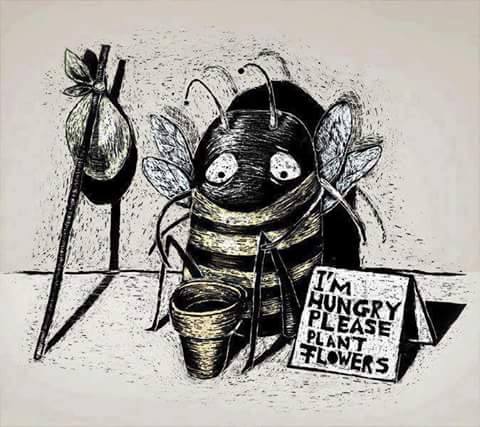By Tara Katlyn
Because honey is profitable, the honey industry has created the misconception that stealing honeybees’ food source somehow benefits them. In reality, the honey industry harms not only the honeybees, but also other species of bees and pollinators. In the US, the honey industry is particularly damaging, as honeybees are a non-native and invasive species. Here are answers to common questions and misconceptions about honey:
”Bees naturally produce honey, so taking the excess is harmless.”
Honey sold for human consumption is the product of enslavement, exploitation, killing, and stealing someone’s hard work and a source of food that is not ours. It also perpetuates the thoughtless notion that nonhuman-animals are commodities and that they, along with their labor and secretions, exist for us.
“It’s ok for vegans to eat honey because no animals suffer for its production.”
Though this process varies, the treatment of bees in honey production usually goes something like this:
Queen bees often have their wings cut off to prevent them from leaving and, similar to cows, are artificially inseminated with syringes to be bred. Bees have their honey (their food) stolen and in the process are crushed and killed. They are fed a cheap corn syrup that makes them sick, and before winter the hive is either gassed or smoked with the bees alive inside to kill them off for financial reasons. But again, regardless of how the bees are treated, their honey is not created for us.
Another point worthy of mention is that honey is also tested on other animals. This includes dogs, sheep, cattle, horses, donkeys, goats, rabbits, mice, cats and rats.
“But what about local beekeepers?”
Here’s the thing, no matter how ‘nicely’ we obtain the honey, the fact remains that the honey is not ours and the process still consists of exploitation, stealing, objectifying animals, and even killing – whether it’s intentional or not – as bees wind up getting crushed as it’s an unnatural process. The ‘local’ label doesn’t change this.
“But we have to eat honey to save the bees!”
No, we don’t. If you think about it, it makes no sense that in order to save the bees one must steal and eat their honey. We can certainly take care of bees and provide homes for them without exploiting them for our own benefit. At the end of the day, honeybees were naturally making their honey long before we started exploiting them, and will continue to do so without us stealing their honey.
Furthermore, honeybees are not native to the U.S. and compete with other bees and pollinators, causing environmental problems. There are nearly 20,000 different species of bees and 200,000 species of pollinators in general, and with such a vast amount of pollinators, there’s a very tiny list of plants that are dependent solely on honeybees. You’re worrying about the wrong species of bees.
Want to actually help and support bees, among other pollinators?
– Support bee sanctuaries that do not take or sell their honey
– Grow a garden (cosmos, sunflowers, marigolds, lavender, bluebells, crocus, mint, rosemary, poppies, and snapdragons are all good flowers). Better yet – look up which plants support your local pollinators.
– Don’t use synthetic chemicals or pesticides on your lawn
– Let dandelions and weeds grow
– Leave a small bowl of water covered in pebbles outside so these hardworking pals can stop and get a drink
“I love the taste of honey, what can I use instead?”
There are so many tasty vegan alternatives! There’s:
– Maple syrup
– Coconut nectar
– Agave nectar
– Date paste
– Brown rice syrup
– Molasses
– Yacon root syrup
– Bee-free honee
– Homemade pineapple honee (recipe)
– Homemade apple honee (recipe)
Want more info?
– You’re Worrying About the Wrong Bees
– Honey bees make poor substitutes for wild pollinators
– List of Crops That Don’t Need Honeybees
– Is Honey Vegan? Healthy? Humane? (Video)
– Is Honey Vegan?

